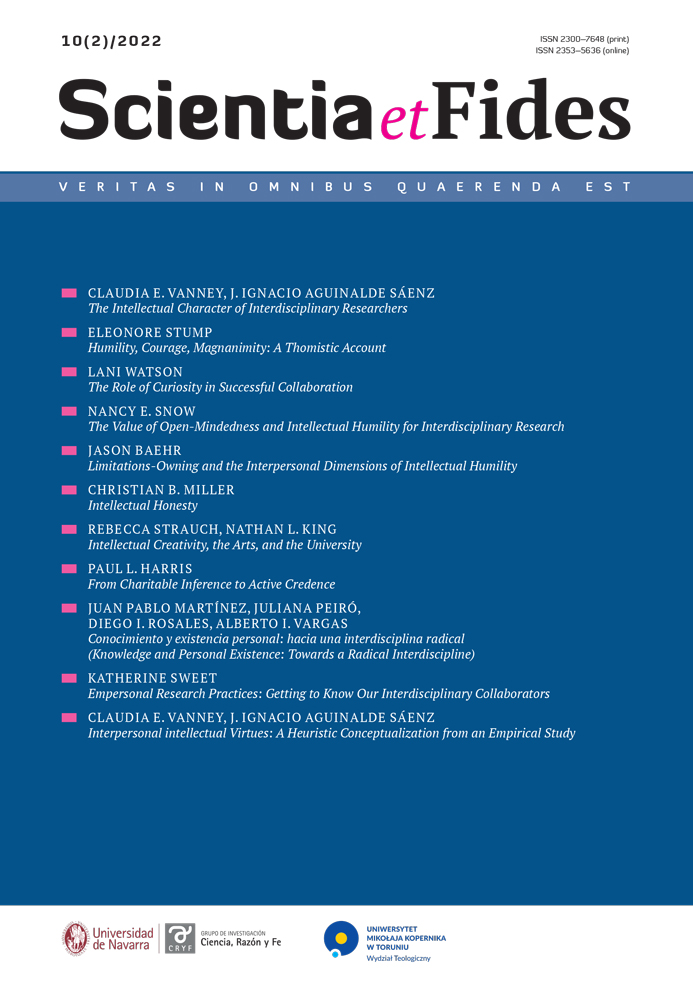The Value of Open-Mindedness and Intellectual Humility for Interdisciplinary Research
DOI :
https://doi.org/10.12775/SetF.2022.018Mots-clés
open-mindedness, intellectual humility, strong interdisciplinary researchRésumé
Academic research is increasingly centering on interdisciplinary work. Strong interdisciplinary research (SIR), involving researchers from very different fields, such as scientists and humanists, is often encouraged, if not required, by funding agencies. I argue that two intellectual virtues, open-mindedness and intellectual humility, are crucial for overcoming obstacles to SIR and achieving success. In part I, I provide a primer on intellectual virtue and the two virtues in question. In part II, I distinguish SIR from weak interdisciplinary research (WIR), which involves research teams from neighboring fields, such as physics and chemistry, and from disciplinary research (DR), which involves researchers from the same discipline. I also outline what counts as success in SIR, and explain why it’s more challenging to attain than in WIR and DR. In part III, I explain how both intellectual virtues are essential for achieving success in SIR and for overcoming obstacles that can arise in its pursuit.
Références
Aristotle. 1985. The Nicomachean Ethics. Translated by Terence Irwin. Indianapolis, IN: Hackett.
Baehr, Jason. 2011. The Inquiring Mind: On Intellectual Virtue and Virtue Epistemology. New York: Oxford.
Battaly, Heather. 2004. “Must the Intellectual Virtues Be Reliable?” INPC Session.
Carter, J. Alan and Emma C. Gordon. 2014. “Openmindedness and Truth.” Canadian Journal of Philosophy 44: 207–224.
Code, Lorraine. 2020. Epistemic Responsibility. 2d ed. Albany, NY: Suny.
Foot, Philippa. 2003. Virtues and Vices and Other Essays in Moral Philosophy. Reprint ed. Oxford: Clarendon.
Montmarquet, James. 1993. Epistemic Virtue and Doxastic Responsibility. Lanham, MD: Rowman & Littlefield.
Riggs, Wayne. 2010. “Open-Mindedness.” Metaphilosophy 41:172–188.
Self, Motivation and Virtue Project. Accessed February 25, 2022. https://smvproject.com/.
Sosa, Ernest. 2011. Reflective Knowledge: Apt Belief and Reflective Knowledge Volume II. New York: Oxford.
Sosa, Ernest. 2009. A Virtue Epistemology: Apt Belief and Reflective Knowledge Volume I. New York: Oxford.
Snow, Nancy E. 2019. “Intellectual Humility.” In The Routledge Handbook of Virtue Epistemology, edited by Heather Battaly, 178–195. New York: Routledge.
Whitcomb, Dennis, Heather Battaly, Jason Baehr, and Daniel Howard-Snyder. 2017. “Intellectual Humility: Owning Our Limitations.” Philosophy and Phenomenological Research XCIV: 509–539.
Turri, John, Mark Alfano, and John Greco. 2021.“Virtue Epistemology,” The Stanford Encyclopedia of Philosophy (Winter 2021 Edition), Edward N. Zalta (ed.), URL = <https://plato.stanford.edu/archives/win2021/entries/epistemologyvirtue/>. Accessed March 28, 2021.
Zagzebski, Linda. 1996. Virtues of the Mind: An Inquiry into the Nature of Virtue and the Ethical Foundations of Knowledge. Cambridge: Cambridge University Press.
Téléchargements
Publiée
Comment citer
Numéro
Rubrique
Licence
© Nancy Snow 2022

Ce travail est disponible sous licence Creative Commons Attribution - Pas de Modification 4.0 International.
CC BY ND 4.0. The Creator/Contributor is the Licensor, who grants the Licensee a non-exclusive license to use the Work on the fields indicated in the License Agreement.
- The Licensor grants the Licensee a non-exclusive license to use the Work/related rights item specified in § 1 within the following fields: a) recording of Work/related rights item; b) reproduction (multiplication) of Work/related rights item in print and digital technology (e-book, audiobook); c) placing the copies of the multiplied Work/related rights item on the market; d) entering the Work/related rights item to computer memory; e) distribution of the work in electronic version in the open access form on the basis of Creative Commons license (CC BY-ND 3.0) via the digital platform of the Nicolaus Copernicus University Press and file repository of the Nicolaus Copernicus University.
- Usage of the recorded Work by the Licensee within the above fields is not restricted by time, numbers or territory.
- The Licensor grants the license for the Work/related rights item to the Licensee free of charge and for an unspecified period of time.
FULL TEXT License Agreement
Stats
Number of views and downloads: 1541
Number of citations: 0



